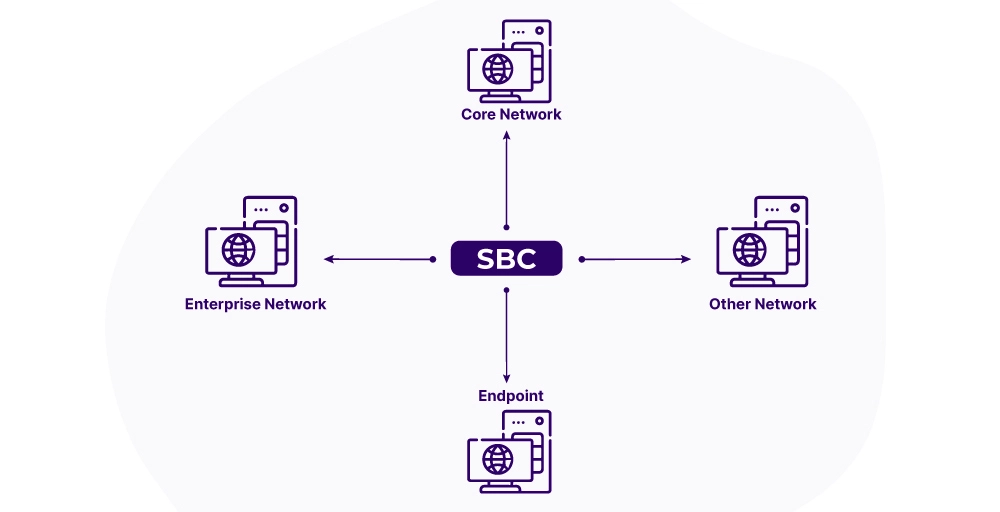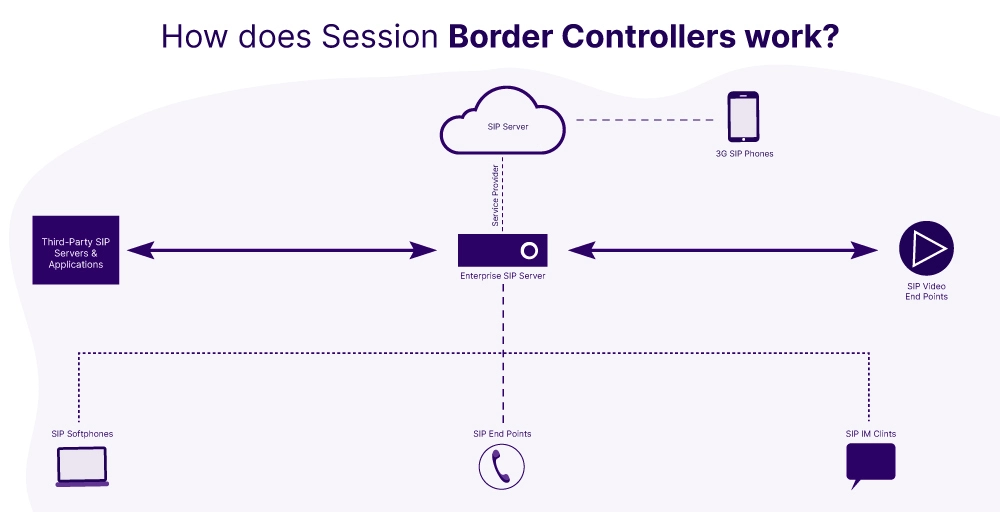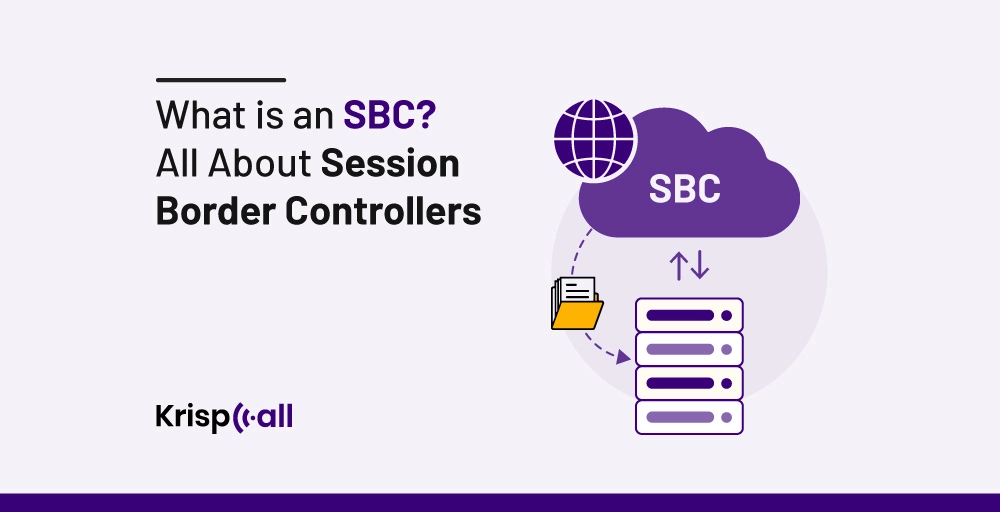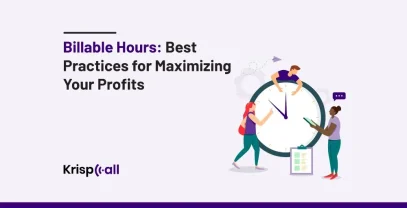As remote work is becoming popular, there is more need for real-time communication tools like video conferencing and audio conferencing so, securing your network, and safeguarding sensitive communication is a crucial task.
However, it can be difficult 😔 to manage intricate communication channels, protect them from online attacks, and maintain compatibility between various systems.
But worry less 😍! Session Border Controllers (SBCs) are a ray of hope as they serve as strong guardians at the periphery of the network, protecting your communication system and streamlining real-time interactions.
In this blog, you’ll learn what SBCs are, how SBCs work, the benefits of SBCs, and what are they used for.
🔑 Key Highlights
- Session Border Controllers (SBCs) are hardware devices or software applications that manage and secure communication sessions acting as gatekeepers.
- The working mechanism of SBCs includes signaling and media handling, protocol normalization, security enforcement, quality of service management, and NAT traversal.
- Some of the benefits of SBCs are enhanced security, improved call quality, cost-effectiveness, and interoperability.
- SBCs are used for call control, security enforcement, protocol normalization, and session monitoring and reporting.
What are Session Border Controllers (SBCs)?
Session border controllers (SBC) are specialized hardware devices or software applications that manage and secure communication sessions while residing at the network’s edge, usually where private and public networks intersect. It monitors and controls phone conversations, which are also called sessions, to ensure secure and efficient communication.

Enforcing security measures is one of the SBC’s main responsibilities. Serving as a gatekeeper, it guards the network from the network of dangers like eavesdropping, illegal access, and denial-of-service (DoS) attacks.
SBCs are responsible for activities like protocol normalization, which include translating communication protocols to provide smooth communication between various networks and devices.
How does Session Border Controllers work?

By acting as middlemen between various communication networks, SBCs help to ensure safe and efficient data transfers during voice calls over the Internet.
Here’s a breakdown of the steps involved in how SBCs work:
1. Signaling and Media Handling
Between endpoints, SBCs intercept and handle media and signaling traffic. Signaling is the sharing of the data for call setup, including feature negotiation, call start, and call termination. The actual voice data being transmitted during the call is known as media. The SBCs manage these aspects to enable communication between protocols and codecs.
2. Protocol Normalization
SBCs carry out protocol normalization since various networks and devices could employ different communication protocols. To ensure flawless communication between all devices involved, SBCs translate the signaling protocols and codecs utilized by one endpoint into formats compatible with the other endpoints.
3. Security Enforcement
Enforcing security measures to safeguard the VoIP network against risks such as fraudulent activities, illegal access, and harmful attacks is a crucial function of SBCs. To protect themselves against these threats, SBCs implement intrusion detection systems, access control mechanisms, and encryption procedures.
4. Quality of Service Management (QoS)
SBCs give traffic priority to preserve excellent call quality, particularly in situations when performance may be affected by network congestion or capacity constraints. SBCs control QoS factors like bandwidth allotment and packet prioritizing, to provide the best possible sound quality during calls.
5. NAT Traversal
NAT may make it difficult for devices with private addresses to connect to public networks directly, which complicates VoIP communications.SBCs enable NAT Traversal by starting and sustaining communication sessions between endpoints.
What are the benefits of SBC?
Session Border Controllers or SBCs have several advantages for voice communication in IP networks. Some of the benefits are:
- Enhanced security: At your network’s edge, an SBC serves as a strong defense system. It prevents unwanted access to your network by implementing access rules and security regulations. It may also detect unusual call patterns and encrypt communication to protect data from eavesdropping and toll fraud.
- Improved call quality: SBCs prioritize bandwidth allocation for real-time traffic, such as voice and video conversations, and manage call routing to provide uninterrupted and seamless communication. As a result, communication experiences are more efficient, and call quality is improved.
- Cost-effectiveness: SBCs help businesses save money by minimizing their reliance on traditional phone services and making the best use of their resources. They ensure the effective use of network resources while streamlining communication procedures.
- Interoperability: Devices using different protocols or codecs on either side of the network may cause communication problems. Using several protocols, SBCs enable communication between devices and networks, ensuring smooth connectivity and interoperability across diverse environments.
- Regulatory compliance: By implementing policies like call admission control, bandwidth management, and adherence to data privacy and security regulations, SBCs assist organizations in meeting regulatory meetings. This ensures that companies’ communication activities meet legal and industry standards.
What is a Session Border Controller used for?
A SBC is used for several essential tasks for controlling and safeguarding voice communication sessions across IP networks.
Some of the primary purposes of Session Border Controller are:
- Call control: SBCs manage the initiation, setup, and end of communication sessions, assuring seamless connectivity between endpoints.
- Security enforcement: SBCs implement security measures including firewalls, access controls, and encryption to protect against fraud, eavesdropping, and denial-of-service attacks.
- Protocol normalization: SBCs ensure interoperability and smooth communication across diverse environments by translating the signaling protocols and codes used by different networks and devices.
- Quality of Service (QoS) management: SBCs control bandwidth and resources to reduce latency, jitter, and packet loss giving priority to voice traffic to maintain high-quality calls.
- Media handling: To maximize speech quality and compatibility, SBCs handle the flow of media packets between callers by transcoding, packetizing, and jitter buffering.
- Interoperability: Using a variety of protocols and devices, SBCs facilitate communications between devices and networks across a wide range of contexts.
- Session monitoring and reporting: SBCs monitor session activity, gather performance measurements, and produce reports to assist administration in troubleshooting problems and maximizing network performance.
Wrapping Up!
In modern communications networks, SBCs are an important component, especially in VoIP (Voice over Internet Protocol) and Unified Communications (UC). SBCs serve as gatekeepers, controlling communication sessions between various networks and devices maintaining efficiency, security, and seamless connectivity.
They are essential for enabling secure, dependable, high-quality voice communication over IP networks as they intercept and process media and signaling traffic, implement strong security measures and enforce quality of service management.
FAQs
How much does Session Border Controller Cost?
The cost of a Session Border Controller can cost between $300 and $55,000 as they vary depending on several factors such as suppliers, the features and functions needed, deployment options (cloud-based or on-premises), and licensing scheme.
What is the difference between Session Border Controllers and PBX?
The difference between SBC and PBX:
| Session Border Controller | PBX |
| It acts as a gatekeeper for VoIP communication ensuring quality of service, security, and compatibility. | It manages internal phone calls made within the organization’s premises including handling voicemail, call routing, and other functions. |
| It enforces security measures to guard against fraud, attacks, and unauthorized access such as access control, encryption, and firewall capabilities. | It offers fundamental security features like access control and user authentication. |
| It ensures smooth connectivity and communication across diverse environments by facilitating interoperability across various communication networks and devices. | It primarily concentrates on internal communication within the company and might not be as compatible with the systems or networks outside it. |
What is the difference between Session Border Controller and Voice Gateway?
The difference between Session Border Controller and Voice Gateway:
| Session Border Controller | Voice Gateway |
| It focuses on protecting and managing IP network communication sessions. | It acts as a bridge between IP-based networks and traditional telephone lines. |
| It can be used as software programs, hardware appliances, and virtualized instances. | It is usually installed as hardware appliances or modules inside the network infrastructure. |





